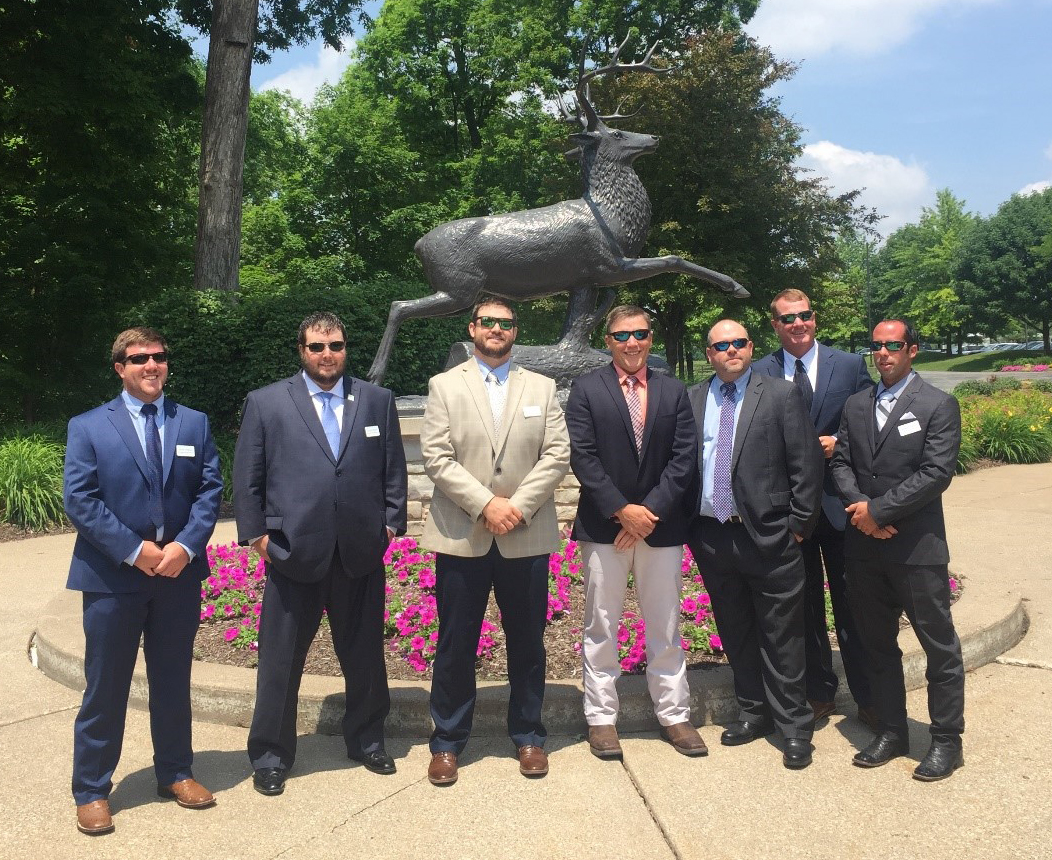 Jason Bond (center) and classmates at John Deere HQ
Jason Bond (center) and classmates at John Deere HQ
Jul 11, 2019
Jason Bond is a weed scientist at Mississippi State University and a member of the 2019-21 Rice Leadership Class. Following is his report on Session II of the two-year program.
STONEVILLE, MS – In the time since Session I, most areas have experienced extreme weather challenges that led to delays in planting and crop establishment. When the workload is big and time is short, it is human nature to focus on a concentrated zone around your area of operation. The growers in our group were able to share their experiences and challenges while those of us representing industry offered them encouraging words because we had observed similar difficulties among our different clientele, but over a wider geography. Conversations like these help strengthen the bond among class members.
Session I emphasized rice development, production, and movement along the Gulf Coast of Louisiana and Texas, and Session II broadened the focus with a trip to the Midwest for visits to the Chicago Board of Trade, John Deere Harvest Works, and rice farms in Arkansas and Mississippi.
Observing active trading and hearing about the history and operating procedures at the Chicago Board of Trade was intriguing as it is vital for rice trading. However, in my small slice of the industry focused on rice production, I had never learned how trading works.
Everyone involved in production agriculture that tours John Deere Harvest Works should depart impressed. The scale of the operation was nearly overwhelming. It was impressive to see one of these massive machines assembled from its basic components. I also enjoyed discussing the future of Deere and Company’s technology in combines and other implements.
Two details from the day in Moline made an impression on me. First was the attitude of the employees with whom we interacted. From managers to tour guides to plant workers, it was obvious that all were excited to be employed by Deere and Company. As we toured the manufacturing plant, nearly every plant worker stopped to smile and wave at our group. The second aspect of Deere and Company I found memorable was how prominently displayed their company values were and the candor with which the tour guide discussed them. According to the guide, John Deere built his company based on integrity, quality, commitment, and innovation. I have made efforts over the years to create a culture in my research/Extension program with defined goals and values. Seeing a historical figure such as John Deere had some of the same ideas is inspirational as my career evolves.
When we arrived in Little Rock, we spent a day learning interview and public speaking skills that will be extremely useful in my profession. Thursday morning we visited Chris and Mark Isbell’s farm. It’s a unique operation with a long history, and I enjoyed hearing about the experimentation that has allowed it to evolve over the years.
A tour of Five Oaks Duck Lodge in Stuttgart, Arkansas, afforded us the chance to see a display of wildlife conservation and how rice production can augment conservation efforts. The owner, George Dunklin, shared his lodge with us for the Arkansas alumni dinner. Meeting other graduates of the program reinforced the importance of developing relationships.
Finally, stops at Producers Rice Mill and Riceland Foods, both in Stuttgart, and Farmers Grain Terminal in Greenville, Mississippi, provided more insight into post-harvest movement and preparation of rice for entering the different markets serviced by growers in the Midsouth.
Session II of the Rice Leadership Development Program was a valuable experience for me personally and professionally. I again was amazed at the intricacies of the rice industry and the level of commitment by the individuals who contribute at all the different levels.